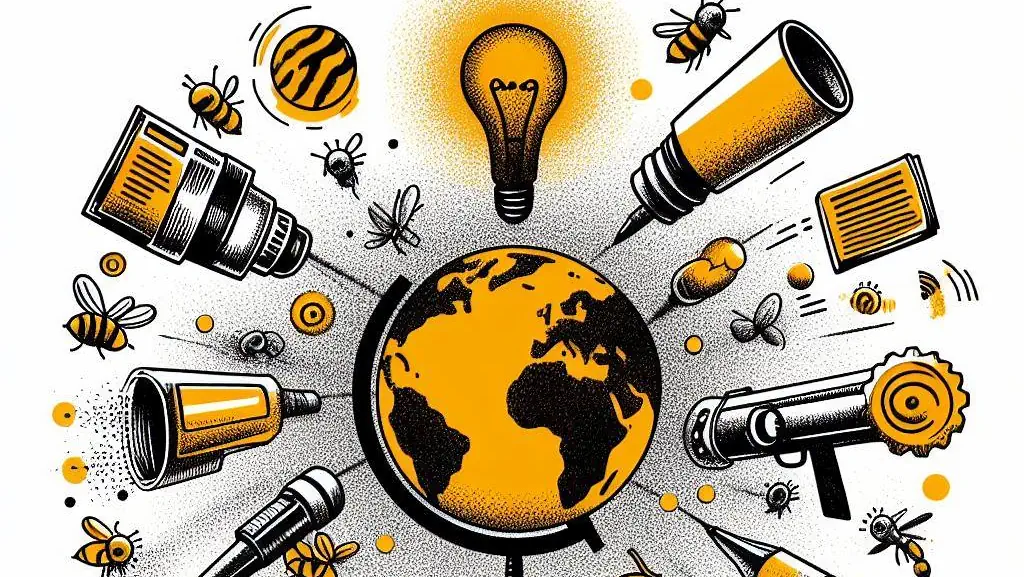 illustration: bing.com/create
illustration: bing.com/createOne of the most critical short-term threats highlighted by global risk experts, policymakers, and leaders from various industries is disinformation. It can be used to manipulate public opinion and undermine democracy. With the development of artificial intelligence technology, disinformation is becoming increasingly realistic and difficult to distinguish from the truth. This could lead to greater social polarization, unrest, and even violence.
The primary concern is AI-based disinformation. AI gives creators of false information new, powerful, and unprecedented tools to fuel conflicts and polarize entire societies. According to the report’s authors, false information combined with social unrest will be in the spotlight due to upcoming elections in several major world economies.
- In recent years, we’ve witnessed incredible technological advancements, mainly with artificial intelligence, which supports progress in many areas of our lives and industries, such as medicine and pharmaceuticals. But this development also brings risks, including cyber threats - comments Artur Grześkowiak, CEO of McLennan in Poland and the CEE Region, in an interview with Newseria Biznes. - Moreover, as noted in the "Global Risks Report," the development of technology and AI may also increase the scale of disinformation and disruptions in information access.
The growing popularity of AI and related cyber threats is having a positive impact on the cyber insurance market, which is already experiencing dynamic growth.
- The use of artificial intelligence presents both opportunities and threats. It can support cybersecurity, but on the other hand, if it falls into the hands of hackers, it can also pose a serious threat - emphasizes Małgorzata Splett, FINPRO & Cyber Leader in the Central and Eastern Europe Region, in an interview with Newseria Biznes. - The widespread use of AI in business will only increase demand for such insurance. Additionally, more competitive pricing and extended coverage options offered by insurers will further support its popularity.
How clickbait was born? Let's take a look inside headline TRAPS 👇
This year’s "Global Risks Report" also points to the rising threat of armed conflicts – experts see it as one of the top five issues over the next two years, and current geopolitical tensions are expected to cause further conflict spread. About two-thirds of global experts predict that within the next decade, a multipolar, fragmented world order will emerge, with medium and major powers competing, setting, and enforcing new rules and norms.
The "Global Risks Report" is prepared by the World Economic Forum in collaboration with Marsh McLennan and Zurich Insurance Group. It analyzes the most serious challenges that may arise over the next decade in the context of rapid technological changes, economic uncertainty, demographics, conflicts, and climate change.
COMMERCIAL BREAK
New articles in section Media industry
Tags, hashtags and links in video descriptions. Youtube SEO after Gemini AI update [ANALYSIS]
BARD
Once, positioning a video on Youtube was simple. It was enough to stuff the description with keywords and wait for results. Those days are not coming back. In 2026, the algorithm is no longer a simple search engine that connects dots. It is the powerful Gemini AI artificial intelligence that understands your video better than you do.
Freelancers 2025 in media and advertising. Useme report
Krzysztof Fiedorek
The modern media and communication market presents entirely new challenges for independent creators. Traditional services are giving way to more complex forms of messaging. The most popular industries in which Polish freelancers operate focus on companies' online presence and visual content.
Video content in Poland. What and how we watch
Paweł Sobczak
Video content is watched remotely, but streaming services are mainly enjoyed in the comfort of home. This is how the consumption of audiovisual content by Poles in 2025 can be summarized. This is the result of an analysis of a study conducted by SW Research and data from the company MEGOGO.
See articles on a similar topic:
Energy under attack. Disinformation threatens Poland’s power transition
KFi
One in five online messages about energy may be fake. Between 2022 and 2025 nearly 70,000 publications warning and condemning disinformation in this strategic sector were recorded in Polish media. They generated a reach of 1.19 billion impressions.
Gen Alpha avoids tough topics. What young people are really looking for
Krzysztof Fiedorek
Generation Alpha prefers humor in 46% of cases, while only 12% are interested in news and political topics. Young people and children consciously limit what negatively affects their emotions - according to the report "Gen Alpha Unfiltered" published by GWI.
Read digital newspapers and magazines in PDF, EPUB and MOBI [LINK]
AUTOPROMOCJA Reporterzy.info
The most popular daily, weekly, biweekly and monthly magazines in electronic PDF, EPUB and MOBI formats. For reading on a computer, smartphone and e-reader. The latest issues, archive issues and subscriptions are just a few clicks away. Visit our Reporterzy.info Store
Influencers 2024. Data, Facts, and Stories from the UNESCO Report
Krzysztof Fiedorek
As many as 68% of digital creators are nano-influencers. One in three has experienced hate speech, and over 60% do not thoroughly verify information before publishing. Moreover, only half disclose their content sponsors. The findings from the "Behind The Screens" report are both inspiring and alarming.





























